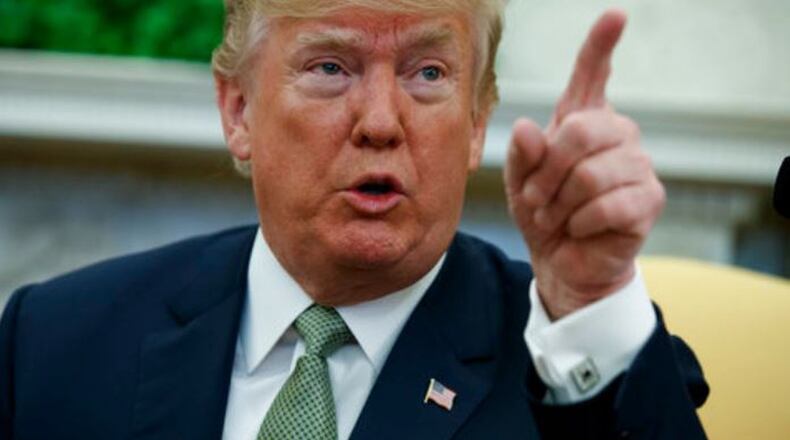Important government posts are empty, but allocating blame is more complicated than President Donald Trump suggests. Democrats bear some responsibility, but so do Senate Republicans and the Trump White House.
Compared with recent presidents, Trump has had the fewest nominees confirmed to date, according to the White House.
Among recent presidents, Trump has had the smallest percentage of nominees confirmed by the Senate at this point in his presidency, 57 percent. That’s below Presidents Barack Obama (67 percent), George W. Bush (78 percent), Bill Clinton and George H.W. Bush (each with 81 percent).
Historically, senators routinely confirmed lower-level presidential nominees without much fanfare. More recently, that’s changed.
In 2013, the Democratic-controlled Senate weakened Republicans’ ability to filibuster Obama’s nominees. Republicans responded with procedural combat and now Democrats have answered in kind, putting even non-controversial nominees through the procedural gamut.
Under the 2013 rule change, the number of votes required to break a filibuster of presidential nominees, through a process called cloture, was lowered from 60 to a simple majority of 51. But minority parties adopted new tactics. For instance, once the majority party breaks a filibuster, the minority party is allowed 30 additional hours of debate. Democrats can use this maneuver to drain the clock and bog down the confirmation process.
According to the White House, Democrats have forced 78 cloture votes on Trump’s nominees.
But experts not all Democratic obstruction should has been mere partisan warfare. Legitimate concerns have surrounded some Trump nominees’ qualifications. And, Senate Majority Leader Mitch McConnell, R-Ky., could keep the Senate in session for more hours to mitigate Democrats’ use of the cloture process.
Another procedural hurdle nominees face is the Senate “hold.” Generally, a single senator may seek to hold up an executive nominee by withholding consent. Ultimately, the decision to honor a hold request is up to the majority leader. Leaders typically grant these requests because denying a hold creates alternative ways for the senator to spend scarce floor time, according to the Congressional Research Service.
Not surprisingly, Democrats have used this tactic. But Republican senators have also issued a significant number of holds as a way to extract concessions on various policy issues. (It’s difficult to make a systematic tally of which party is behind these delays because senators are not always required to publicly disclose holds.)
One analysis found that of the eight published objections in 2017, four came from Republican Chuck Grassley of Iowa. More intraparty holds have been placed in recent months, Politico reported in February, with at least 11 Republican senators publicly blocking nominees for the Energy, State and Justice departments, among other agencies.
David Lewis, a Vanderbilt University political science professor, noted Sen. Cory Gardner, R-Colo., has held up Justice Department nominees over differences with the administration on marijuana policy. “It is certainly true that Democrats have used their institutional prerogatives to slow things down,” Lewis said. “That said, Republicans have as well.”
The Partnership for Public Service, which tracks political appointees, notes that more than 200 key positions don't even have nominees.
Trump himself has suggested an understaffed bureaucracy might be a feature of his administration rather than a defect. He told Forbes in October 2017: "I'm generally not going to make a lot of the appointments that would normally be — because you don't need them," he says. "I mean, you look at some of these agencies, how massive they are, and it's totally unnecessary. They have hundreds of thousands of people."
In contrast to bureaucratic nominations, Trump has appointed more circuit court judges in his first year than any president in history, and ranked sixth overall in first-year federal judge appointments (trial court, appeals court and Supreme Court combined).
Experts attributed this to better coordination between the White House and Senate on judges than executive appointments. Some suggested Republicans have simply made judicial appointments a higher priority.
Our ruling
There’s a lot of blame to go around for the federal government’s relatively modest headcount. Senate Democrats, adopting the upper chamber’s new norms, have engaged in procedural combat. Yet Senate Republicans have also held up Trump’s nominees.
We rate this Half True.
About the Author
The Latest
Featured


